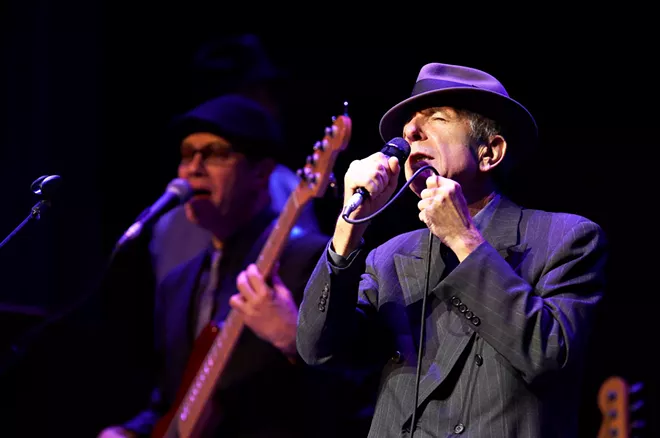Even if you've never heard of Leonard Cohen, you've almost certainly heard his song "Hallelujah." Maybe you've heard the version by Jeff Buckley, or John Cale, or Rufus Wainwright, or a contestant on a TV singing competition. Maybe you don't even realize that you've heard it, because it was playing at the grocery store or in a movie or TV show. It's one of those songs that's become so ubiquitous that it's transitioned into background noise.
Filmmakers Daniel Geller and Dayna Goldfine aim to unpack that phenomenon in their documentary Hallelujah: Leonard Cohen, a Journey, a Song, inspired by the book by Alan Light. They're only partially successful, though, delivering a sometimes awkward mix of biography and cultural anthropology. The movie opens with the late Cohen performing "Hallelujah" at his final concert in 2013, and spends the next hour or so giving a summary of Cohen's life and career, leading up to the release of the original version of "Hallelujah" on his 1984 album Various Positions.
Cohen, who was a successful poet before becoming a singer-songwriter, had a fascinating and varied career, but there's nothing particularly compelling about the way that Geller and Goldfine lay out those details, employing standard talking heads and archival footage. By the time Hallelujah gets to the recording of "Hallelujah," it's easy to forget that this isn't just meant to be a straightforward Cohen career-overview piece. That makes it a bit jarring when the movie suddenly shifts focus to the life of Jeff Buckley, before veering back to Cohen.
Once Geller and Goldfine start digging into the particulars of how "Hallelujah" metamorphosed from a deep cut on a failed Cohen album (which was initially rejected by his U.S. record company) into a cultural touchstone, Hallelujah asserts a more distinctive cinematic identity. The filmmakers trace every step of the song's evolution, starting with Cohen's lengthy composition process, which stretched over a period of years and included, according to one interviewee, more than 150 potential verses. Cohen himself reworked the song in live versions after the studio recording was essentially buried, and Bob Dylan was the first of many artists to take it up as a favorite Cohen tune to cover.
The song's later, higher-profile evolution includes Buckley, the Shrek soundtrack, many questionable auditions from shows like American Idol, and eventual pop-culture saturation. Hallelujah doesn't give all of these unlikely developments their full due, glossing over the reality shows in a single, cringe-inducing montage, and allowing major artists like Eric Church, Regina Spektor and Amanda Palmer only brief snippets of commentary. After a relatively short but illuminating detour, Hallelujah returns to Cohen, highlighting his late-life resurgence in popularity that owed quite a bit to the rise of "Hallelujah."
There are a lot of valuable insights in Hallelujah, about the sometimes arbitrary ways that art can find its way into the popular consciousness and about how songs can take on different meanings when interpreted by different artists. Anyone whose primary experience of "Hallelujah" is as a now-clichéd bit of shorthand for mournful regret will likely gain a new appreciation for the deep, personal soul-searching that Cohen put into its composition.
The problem is that those insights take up only about a third of the two-hour movie, which is otherwise a perfectly serviceable musical biography about a landmark singer-songwriter. Cohen was far more than just the man behind "Hallelujah," and the movie provides a good jumping-off point for exploring his other work. That's what any decent music documentary ought to do, though, and in its best moments Hallelujah is much more expansive than that. It reaches for grand statements, but pulls back into the mundane. ♦

